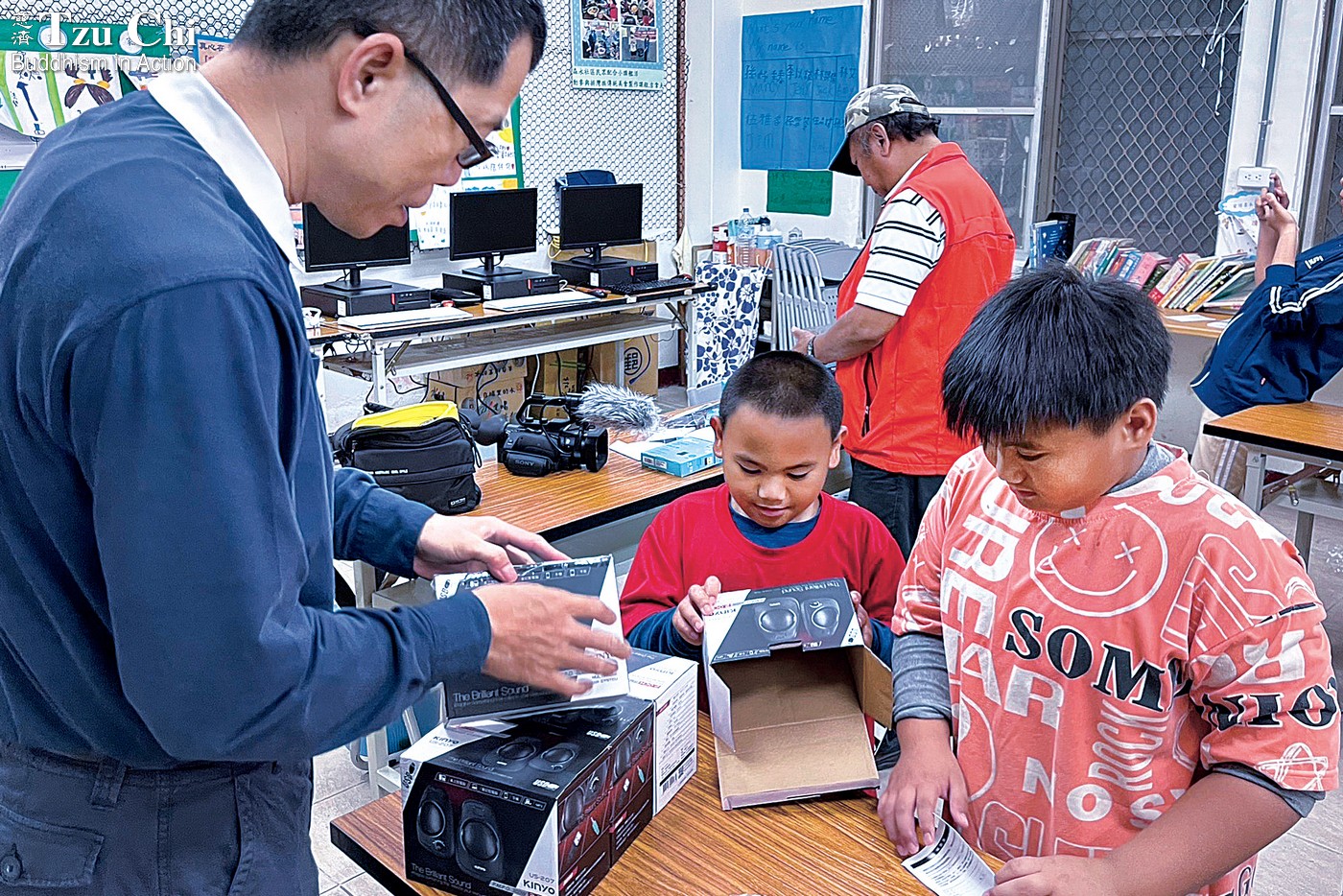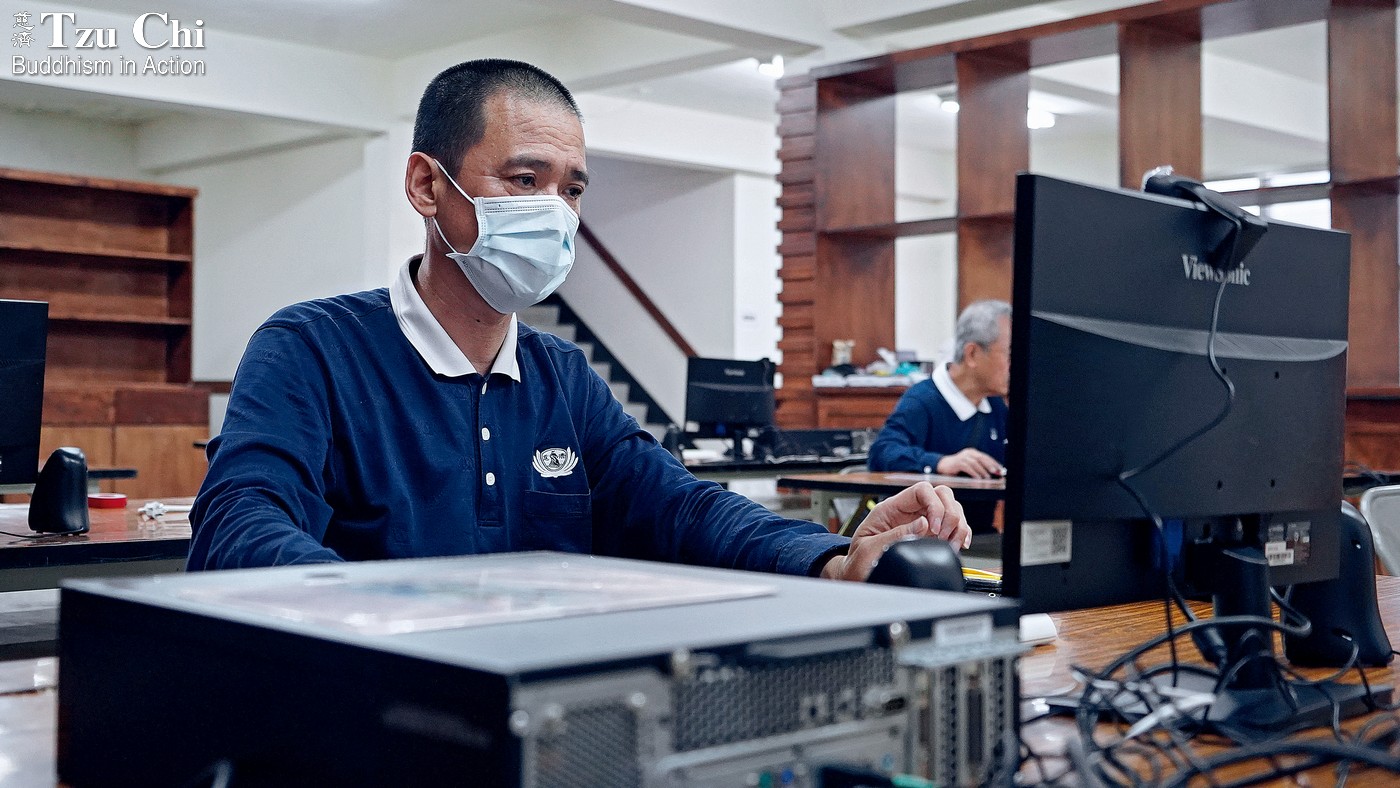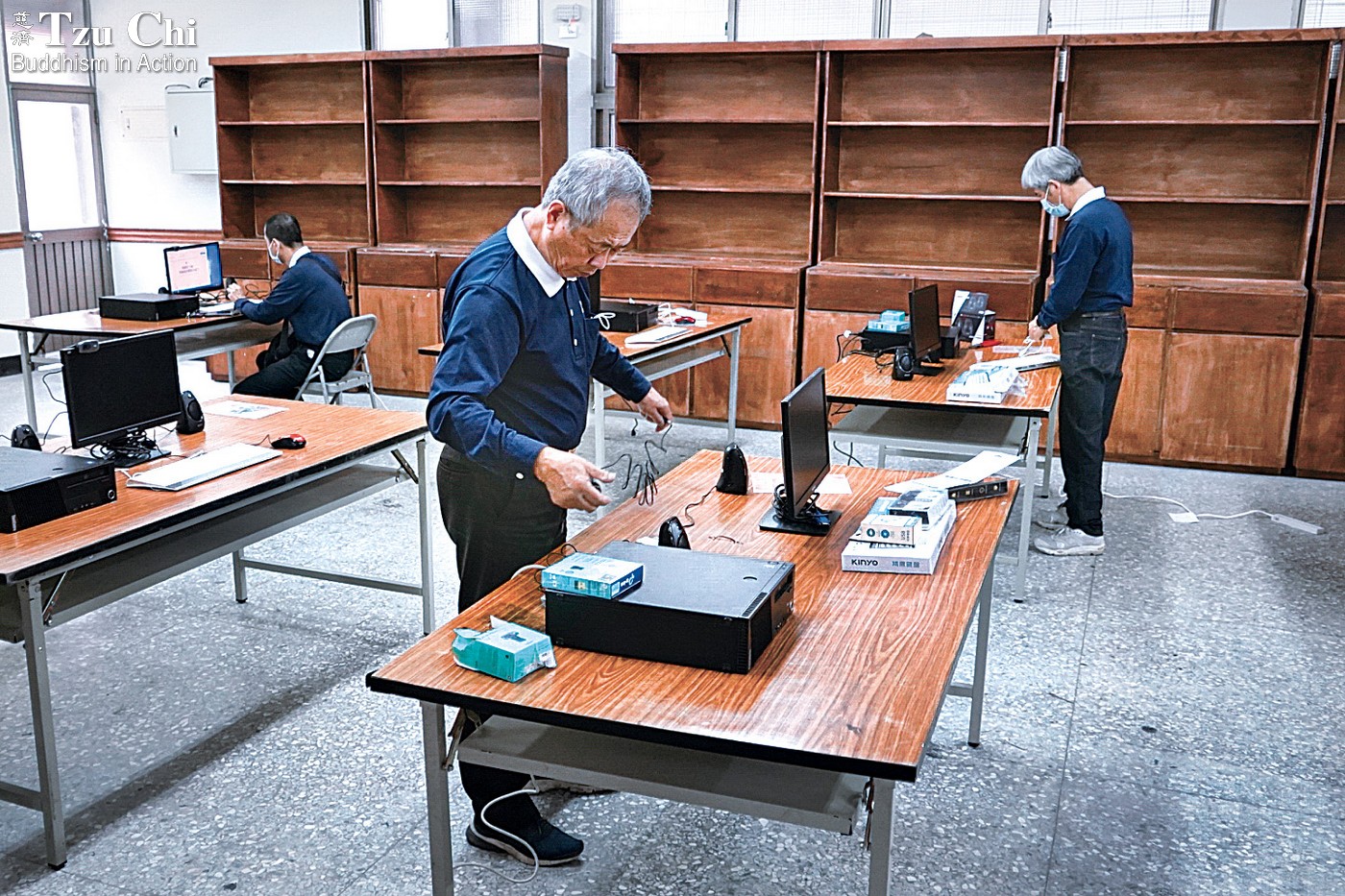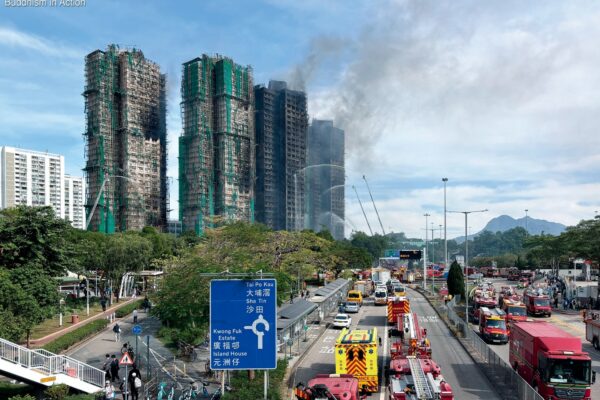By Shi Jin-yu
Translated by Wu Hsiao-ting
Photos by Ye Jin-hong
A volunteer team refurbishes and provides recycled computers to those in need. Helping others gives them fulfillment while also extending the lifespan of the devices.

Children from a tutoring class in Daren Township, Taitung County, southeastern Taiwan, eagerly watch as a volunteer from the Hsinchu Recycled Computer team unboxes speakers and other equipment, excitedly anticipating the availability of computers.
Wu Xiong-lin
“Access to computers and the Internet enhances children’s motivation to learn and expands their horizons by connecting them with the wider world,” said Secretary-General Xu Hao (徐皓) of the Chunyang Community Development Association in Ren’ai Township, Nantou County, central Taiwan. His statement followed Tzu Chi’s donation of computers to the association this past April for use in its tutoring classes for elementary and junior high school students from the local tribal village. Xu expressed gratitude to Tzu Chi for providing such excellent educational resources, enabling the children to access videos and online materials while working on their homework at the association.
All the donated computers were sourced from Tzu Chi’s recycling stations. Despite being recycled, they performed just as efficiently as regular desktop computers, thanks to the volunteers who assembled and refurbished them, replacing any necessary components. “I strongly support the concept of resource recycling,” Xu stated. “It greatly benefits environmental conservation and imparts valuable lessons to our children about environmental protection.”
In mid-March of this year, the Tzu Chi Eco-Friendly Assistive Device Program donated assistive devices to Ren’ai Township. The Chunyang Community Development Association’s activity center served as a central location for distributing the donated devices to 15 villages in the township. Tzu Chi volunteers, while interacting with Secretary-General Xu there, learned about the association’s need for computer equipment to support their tutoring classes. In response, the foundation’s Recycled Computer Program in Hsinchu, northern Taiwan, decided to donate eight refurbished computers.
On April 10, five Tzu Chi volunteers gathered at the Ren’ai Township office and held a donation ceremony for the eight computers. Mayor Jiang Zi-xin (江子信) was in attendance to receive the contribution on behalf of the township.
Three of the five volunteers, Wu Xiong-lin (吳雄麟), Zhang De-sheng (張德盛), and Liu Qian-de (劉千德), were from the Recycled Computer Program. The day before the donation ceremony, they had traveled from northern Taiwan to the Chunyang Community Development Association, located at an altitude of 1,200 meters (3,937 feet), to deliver the eight computers. It took them over two hours to install and successfully test the computers. Aware of the higher humidity in the mountainous area, they advised the Secretary-General to take precautions with the computers to avoid damage caused by excessive moisture. They suggested not placing the computer towers directly on the ground and emphasized the importance of keeping the power cords connected. Shutting down the computers while leaving them on standby power would prevent excessive moisture on the motherboards from building up. They also said that they could be contacted for remote assistance should any software issues arise in the future.
The birth of the program
Wu Xiong-lin, Zhang De-sheng, and Liu Qian-de are full of gratitude for the opportunity to donate to the association. As repair and maintenance volunteers for the Recycled Computer Program, they wholeheartedly embrace their roles as active participants in the deeply meaningful initiative.
Liu Qian-de, an information technology professional, was instrumental in the establishment of the Recycled Computer Program. As part of a Tzu Chi sound control team, he was responsible for maintaining computer equipment at the Hsinchu Jing Si Hall and various recycling stations. Whenever equipment was damaged, additional purchases were required. To reduce costs, he started paying attention to discarded computers that ended up at Tzu Chi’s recycling stations. In testing these, he discovered that some of them could be salvaged. In some instances, this required assembling components from multiple machines to restore a computer’s functionality. By revitalizing discarded computers, he achieved significant savings in procurement costs.
Because of his efforts in reclaiming and refurbishing desktop computers and laptops obtained from Tzu Chi recycling stations or volunteers’ homes, almost every recycling station in Hsinchu is now equipped with sound control computers available for volunteers to use during gatherings.
Liu also provided refurbished computers to ensure uninterrupted learning for his daughter’s classmates during Taiwan’s level three alert period of the COVID-19 pandemic, when students had to attend online classes. Inspired by this experience, he thought of other children in families receiving Tzu Chi’s care, motivating him to extend his support to more families in need.
His dedication to helping the underprivileged inspired fellow volunteers to contribute donations to purchase computer peripherals. His work also prompted Tzu Chi volunteer Wu Mei-yun (吳美雲), who specializes in computer peripherals, to generously provide keyboards, mice, speakers, and other accessories. With the addition of wireless network cards and web cameras, complete and fully functional computer sets could be assembled.
The initiative gradually expanded its reach from Tzu Chi care recipients in Wufeng and Jianshi Townships, Hsinchu, to encompass disadvantaged families, people in need, and community organizations in Penghu, Kaohsiung, Tainan, and other areas. One example involved 24 Ukrainian students attending Tzu Chi University in eastern Taiwan, some of whom required desktop computers for their online classes. The Hsinchu Recycled Computer team stepped forward and donated two sets of computer equipment to assist them. Another example included students from the Social Work Department of Shih Chien University in northern Taiwan. These students recently embarked on a philanthropic mission to northern Thailand, accompanied by five recycled laptops provided by the program. The laptops were brought to the country to be donated to those in need.
By mid-May 2023, the program had donated 343 refurbished computers. “We hope to recruit more like-minded people to join our ranks and revitalize more discarded computers,” said Liu Qian-de. He envisions the establishment of recycled computer teams in other regions, enabling local communities to reap the benefits.

Liu Qian-de (pictured here) and fellow volunteers from the Hsinchu Recycled Computer Program make a meaningful impact by repairing discarded computers and donating them to disadvantaged families and organizations. Their efforts conserve valuable resources and extend a helping hand to those in need.
From trash to treasure
Wu Xiong-lin, 72, another member of the program, began using a computer when he became a Tzu Chi documenting volunteer, which involved tasks such as videotaping and editing. He didn’t get off to a good start on his computer journey though. His lack of knowledge in proper computer usage led to the malfunction of his first computer within a year and a half. Determined not to be discouraged, he decided to learn computer assembly to become more familiar with the technology. The second computer he used lasted a lot longer and gave him a sense of accomplishment in overcoming challenges associated with computers.
In 2022, Liu Qian-de invited Wu to join the Hsinchu Recycled Computer team. Wu strongly supports the initiative, saying, “Through computer recycling and reuse, we can transform trash into treasure and minimize environmental damage.”
Repairing and rejuvenating computers can be a highly challenging task, but Wu derives great joy from identifying and fixing their faults. What may appear to others as an obsolete machine is for Wu an opportunity for accomplishment. Engaging in computer repairs has helped him to not only hone his skills but also cultivate his patience, transforming him into a gentler and more composed person. His wife, Peng Yu-qin (彭玉琴), happily attested to this positive change: “He has undergone a complete and remarkable transformation.”
Wu’s role as a documenting volunteer requires him to assist in recording the operations of the Tzu Chi Eco-Friendly Assistive Device Program. This entails accompanying fellow volunteers on visits to various locations to deliver assistive devices while capturing their work. Initially, he had concerns about managing the delivery of assistive devices as well as the delivery of computers, but he soon discovered that the two could be combined. “I’m like a traveling salesman, going all around Taiwan,” he said, “but I approach it with a sightseeing mindset. I’m very happy!” With his vibrant nature, he finds rejuvenation through these activities, and he feels youthful and full of energy. He is also open to future learning and opportunity. “I want to venture onto new paths. Since I am here in this world, I want to continue embracing new experiences and learning. I want to avoid a monotonous life confined to simply sitting and enjoying tea or coffee!”
Wu recognizes the value of his work. He said, “Even though the computers we provide are recycled, there is still a considerable demand for them. It is vital for us to expedite the repair process to meet this need.” He sincerely hopes that students will appreciate the value of these carefully restored devices and make good use of them. He also emphasizes that their mission extends beyond mere distribution, as they follow up with new owners to learn how the computers are working and offer additional support.

Members of the Hsinchu Recycled Computer team install and test computers at the Chunyang Community Development Association in Ren’ai Township, Nantou County, central Taiwan.
Busy retiree
Zhang De-sheng joined the program after retiring from the furniture industry in March last year. He started by connecting and testing recycled screens for malfunctions. Under the guidance of his team members, he has now become proficient in assisting with repairs. “I find it engaging,” he said. “When I sit down to work, time flies by, and I never feel a moment of boredom.”
Zhang’s weekly routine is packed with volunteer activities. He spends three days repairing computers, one day doing recycling work, and another day serving at a long-term care center. He sets aside the weekends for his family. “I’ve been really busy since retirement, but it’s fueled by my own passions. I derive so much enjoyment from my volunteer work that I often feel that time slips away too quickly,” he exclaimed.
Regarding his involvement in the Recycled Computer Program, Zhang dedicates most of his time to computer repairs, rarely going out for computer deliveries. Despite the sedentary nature of his role, “I find a profound sense of fulfillment in being able to prolong the lifespan of devices and help others,” he said. He takes joy in his contributions and is deeply moved by the teamwork and mutual support among the members. “That’s what touches me the most,” he adds.
The mission to cherish resources and help people in need drives the unwavering commitment of the Hsinchu Recycled Computer team. They tirelessly work towards bridging the digital learning gap for children from underprivileged families and in remote areas, uniting efforts for the betterment of society and the environment.



